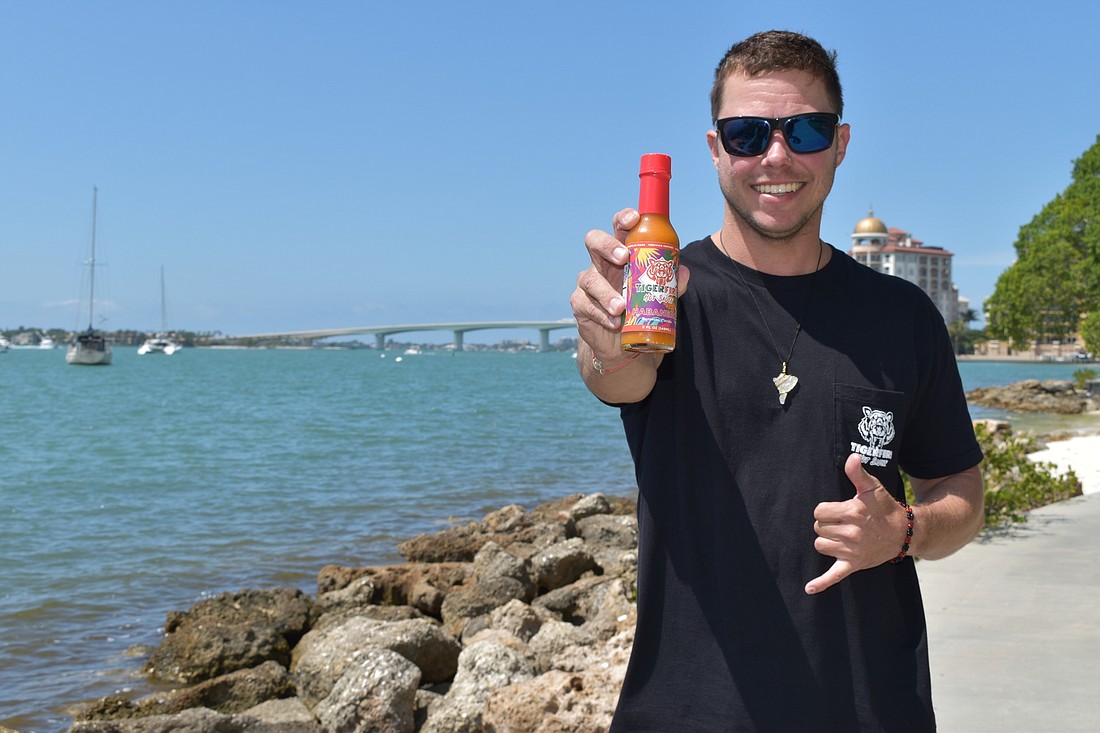- May 30, 2025
-
-
Loading

Loading

Max Famiglietti came up with the idea for Tiger Fire Hot Sauce as the COVID-19 pandemic began to take hold while quarantining in Peru.
During a March 2020 backpacking trip throughout South America, the 30-year-old Sarasota native found himself stuck inside Moksha Yoga and Surf Hostel in Huanchaco, a small Peruvian surf town.
“I saw the COVID happening and this country is starting to shut down, so I was going to go to Peru where I’d been before, like a little small town, and just like hunker down and ride this pandemic out, and hopefully surf the whole time,” Famiglietti said. “[It] turns out we couldn’t surf for the first 2.5 months, and obviously it was way more hardcore of a lockdown than any of us expected.”
Famiglietti said he was among 26 people not allowed to leave the hostel. Eventually, Famiglietti said the group set up a mini-market inside and began to cook for themselves.
March 31, 2020, marked the first time Famiglietti made his homemade hot sauce. A friend had scrounged up limes that were already squeezed and ahi escabeche peppers.
“I got these peppers and I was like, ‘Oh man, I’m going to make some hot sauce,’” Famiglietti said. “I’ve always loved hot sauce.”
Famiglietti said he used a small scale to measure his ingredients, and that it took him four times to perfect his sauce recipe. He said while Central America is a “hot spot” for hot sauce, South America tends to offer sauce with tamer heat levels.
The group tried the hot sauce on eggs, plantain chips, potatoes, French fries, chicken and chaufa rice.
“Hot sauce quickly became a currency,” Famiglietti said. “I traded spoons of it for all kinds of stuff. Beers, meals, snacks, etc. Everything I put it on, I got to eat too.”
When the restaurant near Famiglietti’s hostel opened, he began selling his hot sauce in small plastic containers.
Around the same time, Famiglietti started seeing memes on his social media feeds about the popular Netflix documentary “Tiger King.”
“For one night, it was like the night before I made the sauce, just randomly that happened at the same time, but I got people to pile in a room and watch the first episode. And like, people walked out,” Famiglietti said. “They were like so not about it and I was just like, pinned to the screen, jaw on the floor, laughing.”
Tiger Fire Hot Sauce was born, combining the Peruvian influence and wildly popular TV documentry. He also began documenting his hot sauce on Instagram.
“People were hitting me up like, ‘Oh, that looks so good,’” Famiglietti said. “This is like kind of proof of concept. I’m going to bring this back to the [United] States.”
In December 2020 when Famiglietti returned to Florida, he struggled to find a job with his mechanical engineering degree from the University of Florida and thought about his new recipe.
Famiglietti said if he wanted to turn the company into a legitimate business, he had to be approved by the U.S. Food and Drug Administration. It required production in a commercial kitchen.
Famiglietti found a co-packer based in Wauchula. The co-packer also agreed to sign a non-disclosure agreement on Famiglietti’s recipes. The ingredients come from farmers in the Orlando area.
“They source all of the ingredients, and then they cook it for you and bottle it and label it and return you a licensed product that you can sell to stores and stuff now,” Famiglietti said.
To pay homage to Tiger Fire’s origins, Famiglietti said he would love if Joe Exotic got to sample his hot sauce.
“The ‘Tiger King’ needs to try Tiger Fire,” Famiglietti said.
Tiger Fire Hot Sauce is offered for $6.99 a bottle.